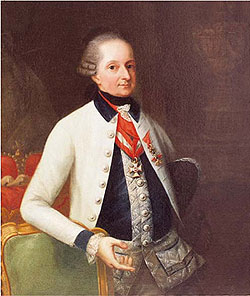
Franz Joseph Haydn was an Austrian composer of the Classical period. He was instrumental in the development of chamber music such as the piano trio. His contributions to musical form have earned him the epithets "Father of the Symphony" and "Father of the String Quartet".
Johann Evangelist Haydn was a tenor singer of the classical era; the younger brother of the composers Joseph Haydn and Michael Haydn. He was often called "Hansl", a diminutive form of "Johann".
An urtext edition of a work of classical music is a printed version intended to reproduce the original intention of the composer as exactly as possible, without any added or changed material. Other kinds of editions distinct from urtext are facsimile and interpretive editions, discussed below.
The composer Joseph Haydn is sometimes given the nickname "Papa" Haydn. The practice began in Haydn's lifetime and has continued to the present day.

Nikolaus I, Prince Esterházy was a Hungarian prince, a member of the famous Esterházy family. His building of palaces, extravagant clothing, and taste for opera and other grand musical productions led to his being given the title "the Magnificent". He is remembered as the principal employer of the composer Joseph Haydn.
Symphony No. 93 in D major, Hoboken I/93, one of the twelve London symphonies written by Joseph Haydn.
Ulf Håkan Hardenberger is a Swedish trumpeter. Taking up the trumpet at the age of eight under the guidance of hometown teacher Bo Nilsson, Hardenberger pursued further studies at the Paris Conservatoire, with Pierre Thibaud, and in Los Angeles with Thomas Stevens. He has quickly established a career as a virtuoso who possesses not only an impressive command of the classical repertoire, but has also commissioned many new works from contemporary composers, including Harrison Birtwistle, Toru Takemitsu, Hans Werner Henze, Rolf Martinsson, Mark-Anthony Turnage, Heinz Karl Gruber, Benjamin Staern, Brett Dean, Tobias Broström and Arvo Pärt. Hardenberger has been called "the cleanest, subtlest trumpeter on earth" by The Times.
Symphony No. 14 in A major, K. 114, is a symphony composed by Wolfgang Amadeus Mozart on December 30, 1771, when Mozart was fifteen years old, and a fortnight after the death of the Archbishop Sigismund von Schrattenbach. The piece was written in Salzburg between the composer's second and third trips to Italy. Mozart was also influenced by J. C. Bach's "Italianate" style of composition."

The composers Wolfgang Amadeus Mozart and Joseph Haydn were friends. Their relationship is not very well-documented, but the evidence that they enjoyed each other's company and greatly respected each other's work is strong, and suggests that the elder Haydn acted in at least a minor capacity as a mentor to Mozart. Six string quartets by Mozart are dedicated to Haydn.
The ethnicity of the composer Joseph Haydn was a controversial matter in Haydn scholarship during a period lasting from the late 19th to the mid 20th century. The principal contending ethnicities were Croatian and German. Mainstream musical scholarship today adopts the second of these two hypotheses.
James Webster is a musicologist, specializing in the music of Joseph Haydn and other composers of the classical era. His professional position is as the Goldwin Smith Professor of Music at Cornell University.

Mogens Wöldike was a Danish conductor, choirmaster, organist, and scholar known for his interpretation of music from the Baroque and Classical periods. His son-in-law was the Haydn scholar Jens Peter Larsen.

L’incontro improvviso is an opera in three acts by Joseph Haydn first performed at Eszterháza on 29 August 1775 to mark the four-day visit of Archduke Ferdinand, Habsburg governor of Milan and his consort Maria Beatrice d'Este. The opera is designated a dramma giocoso and is an example of the then Austrian fascination with Turkish subjects.
Karl Geiringer was an Austrian American musicologist, educator, and biographer of composers. He was educated in Vienna but at the beginning of the Nazi years he emigrated to England and ultimately the United States, where he had a lengthy and distinguished career at several universities. He was a noted authority on Brahms, Haydn, and the Bach family, and a prolific author.
Events from the year 1957 in Denmark.
This article discusses the influence of folk music on the work of the composer Joseph Haydn (1732–1809).
Jens is a male given name and a Danish, German, Norwegian, Swedish, Faroese and Frisian derivative of Johannes.
The Piano Sonata in E minor, Hob. XVI/34, L. 53, was written in the late 1770s by Joseph Haydn and published in London around 1783 by Beardmore & Birchall.
The Divertimento in G major, Hob. XVI/8, L. 1, was written in 1766 by Joseph Haydn.





